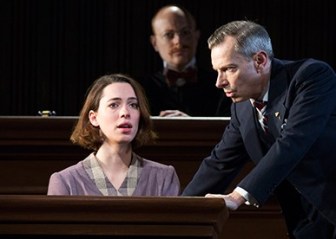Mary Beth Fisher as social worker Caroline in "Luna Gale" at Chicago's Goodman Theatre.
The most startling event of this cold and bleak winter season on Broadway has been the cold and brilliant revival of Sophie Treadwell’s 1928 play Machinal. Treadwell, a journalist who covered the 1927 murder trial of Ruth Snyder, turned that sensational true-crime story — the conviction and execution of a New York woman for the murder of her husband — into an expressionist indictment of a social system that grinds down women, and pretty much eliminates the possibility of free will or happiness for anyone.
One reason Machinal, in a boldly stylized production by British director Lindsey Turner, looks so impressive is that no one writes plays like this any more: characters have no names, the dialogue is robotic and the plot unfolds with ritualistic inevitability. (Its closest cousin is Elmer Rice’s The Adding Machine, another expressionist masterpiece from the ’20s.) But the play also stands out for its social-political perspective, its keen sense of the ways in which individual lives are at the mercy of a social system over which they have no control.

Rebecca Hall as an accused murderer in “Machinal” at the American Airlines Theater in New York.
Rebecca Gilman doesn’t write anything like Sophie Treadwell: she tells her stories in conventional, naturalistic style, and her characters are as rounded and human as Treadwell’s are abstracted and symbolic. But she is a spiritual heir of Treadwell’s, in her social-political concerns and her focus on the ways people are constantly butting up against inflexible or insensitive institutions. In Spinning Into Butter, a college administrator gets caught up in racial politics and political correctness at a small liberal-arts school in Vermont. In Boy Gets Girl, a woman being terrorized by a stalker is victimized again by a law-enforcement system that proves incapable of protecting her without destroying her life in the process. In her much-underrated 2010 play A True History of the Johnstown Flood, Gilman takes aim at the class divide — a lake dammed up for the enjoyment of rich people killed more than 2,000 people in the working-class neighborhood below — that lay behind one of the worst disasters in American history.
In her new play Luna Gale, which opened this week at Chicago’s Goodman Theatre, Gilman again puts the spotlight on societal institutions that seems unable to respond to the needs of real human beings. Caroline (Mary Beth Fisher) is a social worker who is called in when the baby of two meth-addicted teenage parents winds up in a hospital emergency room. She places the baby in the custody of her maternal grandmother, reasoning that it’s a better alternative to foster care. But soon the mother’s fundamentalist Christian fanaticism casts doubt on that decision.

Colin Sphar as young father Peter and Jordan Baker as prospective foster mother Cindy in “Luna Gale.”
What’s best for the baby? The question is complicated by the inadequacy of the social services that have been set up to protect her. Luna’s parents appear to sincerely want to clean up their act so they can get her back — but there is no room for them at the underfunded rehab facility, and the counseling they are offered is useless. Caroline’s supervisor, meanwhile, sees the grandmother as the easiest solution for an overburdened bureaucracy — one in which, we discover, office politics and ass-covering are a key part of the equation
The play, however, doesn’t settle for easy polemics against an insensitive bureaucracy. Caroline’s reaction against the grandmother, her boss suggests, may reflect her bias against the woman’s born-again Christian beliefs. To achieve what she feels is the “correct” end to the custody fight, Caroline tries a morally questionable ploy to bolster the parents’ case. As always in Gilman’s plays, the good people are never without flaws, and the choices never simple.
Luna Gale, I’m afraid, doesn’t quite measure up to the best of Gilman’s work. In her effort to add “complexity” to the moral dilemma, she piles on a few too many plot twists that are hard to swallow — particularly the late introduction of a sexual-abuse subplot. What’s more, the performances — under the direction of the Goodman’s artistic director Robert Falls — are a little too high-pitched and lacking in subtlety, giving the play a more schematic feel than Gilman’s work usually has.
Still, Gilman is a rare playwright who actually seems to live in the real world, and who combines a committed social conscience with an ability to create real and involving characters. Her work has been sadly neglected in New York, where more insular relationship and family dramas, from playwrights like Jon Robin Baitz, Christopher Durang and Richard Greenberg, seem to win most of the raves and awards. Talk about injustice.

